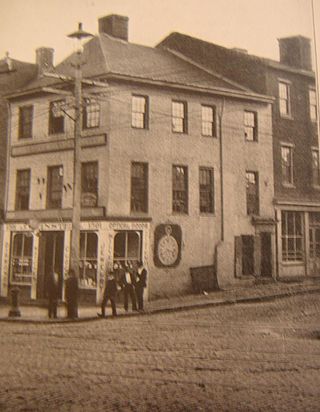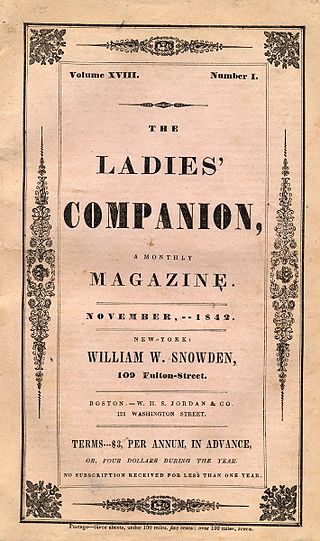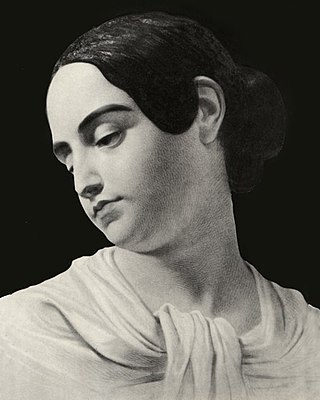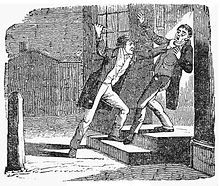
Edgar Allan Poe was an American writer, poet, editor, and literary critic who is best known for his poetry and short stories, particularly his tales involving mystery and the macabre. He is widely regarded as one of the central figures of Romanticism and Gothic fiction in the United States, and of early American literature. Poe was one of the country's first successful practitioners of the short story, and is generally considered to be the inventor of the detective fiction genre. In addition, he is credited with contributing significantly to the emergence of science fiction. He is the first well-known American writer to earn a living by writing alone, which resulted in a financially difficult life and career.

"The Gold-Bug" is a short story by American writer Edgar Allan Poe published in 1843. The plot follows William Legrand, who becomes fixated on an unusual gold-colored bug he has discovered. His servant Jupiter fears that Legrand is going insane and goes to Legrand's friend, an unnamed narrator, who agrees to visit his old friend. Legrand pulls the other two into an adventure after deciphering a secret message that will lead to a buried treasure.

Eliza Poe was an English-American actress and the mother of the American author Edgar Allan Poe.

The Narrative of Arthur Gordon Pym of Nantucket, written in 1838, is the only complete novel by American writer Edgar Allan Poe. The work relates the tale of the young Arthur Gordon Pym, who stows away aboard a whaler called the Grampus. Various adventures and misadventures befall Pym, including shipwreck, mutiny, and cannibalism, before he is saved by the crew of the Jane Guy. Aboard this vessel, Pym and a sailor named Dirk Peters continue their adventures farther south. Docking on land, they encounter hostile, black-skinned natives before escaping back to the ocean. The novel ends abruptly as Pym and Peters continue toward the South Pole.

Jereboam Orville Beauchamp was an American lawyer who murdered the Kentucky legislator Solomon P. Sharp; the crime is known as the Beauchamp–Sharp Tragedy. In 1821, Sharp had been accused in Bowling Green, Kentucky by Anna Cooke of fathering her illegitimate child; it was stillborn.[a] Sharp denied paternity, and public opinion favored him. In 1824, Beauchamp married Cooke, who was seventeen years older than he. She asked him to kill Sharp to defend her honor.

Solomon Porcius Sharp was an American lawyer and politician, serving as attorney general of Kentucky and a member of the United States Congress and the Kentucky General Assembly. His murder by Jereboam O. Beauchamp in 1825 is referred to as the Beauchamp–Sharp Tragedy or "The Kentucky Tragedy."

"Al Aaraaf" is an early poem by American writer Edgar Allan Poe, first published in 1829. It tells of the afterlife in a place called Al Aaraaf, inspired by A'raf as described in the Quran. At 422 lines, it is Poe's longest poem.

The Southern Literary Messenger was a periodical published in Richmond, Virginia, from August 1834 to June 1864, and from 1939 to 1945. Each issue carried a subtitle of "Devoted to Every Department of Literature and the Fine Arts" or some variation thereof and included poetry, fiction, nonfiction, reviews, and historical notes. It was founded by Thomas Willis White, who served as publisher and occasional editor until his death, in 1843.

"The Mystery of Marie Rogêt", often subtitled A Sequel to "The Murders in the Rue Morgue", is a short story by American writer Edgar Allan Poe written in 1842. This is the first murder mystery based on the details of a real crime. It first appeared in Snowden's Ladies' Companion in three installments, November and December 1842 and February 1843. Poe referred to it as one of his "tales of ratiocination".

Virginia Eliza Poe was the wife of American writer Edgar Allan Poe. The couple were first cousins and publicly married when Virginia Clemm was 13 and Poe was 27. Biographers disagree as to the nature of the couple's relationship. Though their marriage was loving, some biographers suggest they viewed one another more like a brother and sister. In January 1842, she contracted tuberculosis, growing worse for five years until she died of the disease at the age of 24 in the family's cottage, at that time outside New York City.

Sarah Elmira Shelton was an adolescent sweetheart of Edgar Allan Poe who became engaged to him shortly before his death in 1849.

"MS. Found in a Bottle" is an 1833 short story by American writer Edgar Allan Poe. The plot follows an unnamed narrator at sea who finds himself in a series of harrowing circumstances. As he nears his own disastrous death while his ship drives ever southward, he writes an "MS.", or manuscript, telling of his adventures which he casts into the sea. Some critics believe the story was meant as a satire of typical sea tales.

The death of Edgar Allan Poe on October 7, 1849, has remained mysterious in regard to both the cause of death and the circumstances leading to it. American author Edgar Allan Poe was found delirious and disheveled at a tavern in Baltimore, Maryland, on October 3. He sought the help of magazine editor Joseph E. Snodgrass and was taken to the Washington College Hospital, where he was treated for his apparent intoxication. Poe had no visitors in the hospital and gave no account of how he came to be in his condition before dying on October 7 at age 40.

Graham's Magazine was a nineteenth-century periodical based in Philadelphia established by George Rex Graham and published from 1840 to 1858. It was alternatively referred to as Graham's Lady's and Gentleman's Magazine, Graham's Magazine of Literature and Art, Graham's American Monthly Magazine of Literature and Art, and Graham's Illustrated Magazine of Literature, Romance, Art, and Fashion.

The Stylus, originally intended to be named The Penn, was a would-be periodical owned and edited by Edgar Allan Poe. It had long been a dream of Poe to establish an American journal with very high standards in order to elevate the literature of the time. Despite attempts at signing up subscribers and finding financial backers and contributors, the journal never came to be.
The Broadway Journal was a short-lived New York City-based newspaper founded by Charles Frederick Briggs and John Bisco in 1844 and was published from January 1845 to January 1846. In its first year, the publication was bought by Edgar Allan Poe, becoming the only periodical he ever owned, though it failed after only a few months under his leadership.

Tamerlane and Other Poems is the first published work by American writer Edgar Allan Poe. The short collection of poems was first published in 1827. Today, it is believed only 12 copies of the collection still exist.

Thomas Holley Chivers was an American doctor-turned-poet from the state of Georgia. He is best known for his friendship with Edgar Allan Poe and his controversial defense of the poet after his death.

The Beauchamp–Sharp Tragedy was the murder of Kentucky legislator Solomon P. Sharp by Jereboam O. Beauchamp. As a young lawyer, Beauchamp had been an admirer of Sharp until Sharp allegedly fathered an illegitimate child with Anna Cooke, a planter's daughter.[a] Sharp denied paternity of the stillborn child. Later, Beauchamp began a relationship with Cooke, who, according to legend, agreed to marry him on the condition that he kill Sharp to avenge her honor. Beauchamp and Cooke married in June 1824, and in the early morning of November 7, 1825, Beauchamp murdered Sharp at Sharp's home in Frankfort.

The works of American author Edgar Allan Poe include many poems, short stories, and one novel. His fiction spans multiple genres, including horror fiction, adventure, science fiction, and detective fiction, a genre he is credited with inventing. These works are generally considered part of the Dark romanticism movement, a literary reaction to Transcendentalism. Poe's writing reflects his literary theories: he disagreed with didacticism and allegory. Meaning in literature, he said in his criticism, should be an undercurrent just beneath the surface; works whose meanings are too obvious cease to be art. Poe pursued originality in his works, and disliked proverbs. He often included elements of popular pseudosciences such as phrenology and physiognomy. His most recurring themes deal with questions of death, including its physical signs, the effects of decomposition, concerns of premature burial, the reanimation of the dead, and mourning. Though known as a masterly practitioner of Gothic fiction, Poe did not invent the genre; he was following a long-standing popular tradition.




















